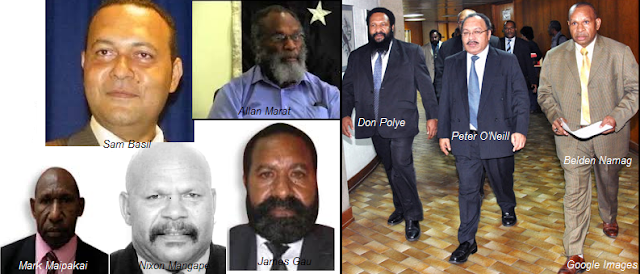Peter O'Neill's People's National Congress has the highest number of MPs (27) followed by Independent MPs (14); Don Polye's Triumph Heritage Empowerment Party has 12 MPs; Patrick Pruaitch's National Alliance Party has 8 MPs; United Resources Party and Papua New Guinea Party has 7 MPs each.
It is important to note that the list contained parties and names of MPs who contested under party banners. Many of the MPs who won under sponsored political parties like THE party have jumped ships.
Others have joined government or defected to opposition and middle bench or scattered at the backbench, caught between party politics.
The three convicted MPs are from PNG Party (Francis Potape), PNC party (Havila Kavo) and PUA party (Paul Tiensten). PNG party has also lost Daniel Mona.
THE party leader, Don Polye, is the Opposition leader. His party deputy leader, Leo Dion, is the Deputy Prime Minister. How can a party leader be the leader of the Opposition while his deputy is the Deputy Prime Minister in the government on the other side of the house?
This simply shows that party politics is fragile and pragmatic with no control measures to strengthen political parties. There is, now, a total collapse in the system and structure of political parties which is a cause for concern.
The Organic Law on the Integrity of Political Parties and Candidates (OLIPPAC; passed in 2001) has failed. Stability within the party is non-existent. Unless political parties are strengthened, Independent MPs and smaller parties can do whatever they want on impulse.
Name Political
Party Number
of Members
1 Joseph Lelang Coalition for Reform Party
2 Sasindran Muthuvel Coalition for Reform Party
2
3 Komun Joe Koim Independent
4 Kila Haoda Independent
5 Noah Kool Independent
6 Ron Ganarafo Independent
7 Bire Kimisopa Independent
8 Robert Atiyafa Independent
9 James Lagea Independent
10 Johnson Tuke Independent
11 Camillus Bongoro Independent
12 Nixon Mangape Independent
13 De Kewanu Independent
14 Kelly Naru Independent
15 Solan Mirisim Independent
16 Richard Maru Independent
14
17 Loujaya Toni Indigenous People's Party
1
18 Malakai Tabar Melanesian Liberal Party
19 Dr Allan Marat Melanesian Liberal Party
2
20 Patrick Pruaitch National Alliance Party
21 Salio Waipo [2] National Alliance Party
22 John Hickey National Alliance Party
23 Sir Michael Somare National Alliance Party
24 John Simon National Alliance Party
25 Joe Sungi National
Alliance Party
26 Kerenga Kua National Alliance Party
27 Jim Simatab National Alliance Party
8
28 William Tongkamp New Generation Party
29 Ronnie Knight New Generation Party
2
30 Sir Puka Temu Our Development Party
1
31 Richard Mendani Papua New Guinea Country Party
32 Jeffrey Kuave Papua New Guinea Country Party
2
33 Sam Basil Papua
and New Guinea United Party (PANGU)
1
34 Daniel Mona (Deceased)Papua New Guinea Party
35 Lukas Dekena Papua New Guinea Party
36 Ross Seymour Papua New Guinea Party
37 Francis Potape(Convicted) Papua New Guinea Party
38 Jim Kas Papua
New Guinea Party
39 Francis Marus Papua New Guinea Party
40 Belden Namah Papua New Guinea Party
7
41 Tommy Tomscoll People's Democratic Movement
42 Paias Wingti People's Democratic Movement
2
43 Labi Amaiu People's Movement For Change Party
44 Garry Juffa People's Movement For Change Party
2
45 Charles Abel People's National Congress
46 Koi Trape People's
National Congress
47 Jim Miringtoro People's National Congress
48 Havila Kavo (Convicted) People's National Congress
49 Peter O'Neill People's National Congress
50 Francis Awesa People's National Congress
51 Bob Dadae People's
National Congress
52 Paru Aihi People's
National Congress
53 Ereman Tobaining Jnr. People's National Congress
54 Nixon Duban People's National Congress
55 Charlie Benjamin People's National Congress
56 Paul Isikiel People's National Congress
57 Roy Biyama People's National Congress
58 Michael Malabag People's National Congress
59 Mangere Siniwim People's National Congress
60 Jeffery Komal People's National Congress
61 Louta Atoi People's National Congress
62 Boka Kondra People's National Congress
63 Isaac Waigavara People's National Congress
64 Ano Pala People's
National Congress
65 Gordon Wesley People's National Congress
66 Aide Ganasi People's National Congress
67 William Powi People's National Congress
68 Ken Fairweather People's National Congress
69 James Marape People's National Congress
70 Mao Zeming People's National Congress
71 Benny Allan People's National Congress
27
72 Wesley Nukundj People's Party
73 Peter Ipatas People's Party
74 Davis Steven People's Party
75 Mogerema Sigo Wei People's Party
76 John Pundari People's Party
77 Robert Sandan Ganim People's Party
6
78 Ezekiel Anisi 1 People's Progress Party
79 Theo Zurenuoc People's Progress Party
80 Ben Micah People's
Progress Party
81 Titus Philemon People's Progress Party
82 Byron Chan People's Progress Party
83 Sir Julius Chan People's Progress Party
6
84 Anderson Agiru People's United Assembly Party
85 Paul Tiensten (Convicted) People's United Assembly Party
86 Ati Wobiro People's United Assembly Party
3
87 Tobias Kulang PNG Constitutional Democratic Party 1
88 Justin Tkatchenko Social Democratic Party
89 Powes Parkop Social Democratic Party
90 Joseph Yopyyopy Social Democratic Party
3
91 Mehrra Minne Kipefa Stars Alliance Party
1
92 Wera Mori Triumph
Heritage Empowerment Party
93 Julie Soso Triumph Heritage Empowerment Party
94 David Arore Triumph Heritage Empowerment Party
95 Don Polye Triumph
Heritage Empowerment Party
96 Mark Maipakai Triumph Heritage Empowerment Party
97 Douglas Tomuriesa Triumph Heritage Empowerment Party
98 Philip Nai Triumph Heritage Empowerment Party
99 Leo Dion Triumph
Heritage Empowerment Party
100 James Gau Gelak Triumph Heritage Empowerment Party
101 Delilah Gore Triumph Heritage Empowerment Party
102 Benjamin Poponawa Triumph Heritage Empowerment Party
103 Akmat Mai Triumph
Heritage Empowerment Party
12
104 Rimbink Pato United Party
1
105 Joe Lera United
Resources Party
106 William Duma United Resources Party
107 Mai Dop United
Resources Party
108 Benjamin Phillip United Resources Party
109 Dr Fabian Pok United Resources Party
110 Steven Pirika Kamma United Resources Party
111 Anton Yagama United Resources Party
7









